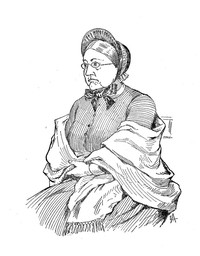Samantha Among the Brethren, Complete by Marietta Holley (the beginning after the end read novel .txt) 📗

- Author: Marietta Holley
Book online «Samantha Among the Brethren, Complete by Marietta Holley (the beginning after the end read novel .txt) 📗». Author Marietta Holley
If you want women in, there is another way to bring them in. Send the question around as you did for lay delegation. There was only a doubt in the General Conference of 1868, and yet they had a sense of candor. John M'Clintock fought in favor of taking them in. But he said, “I think it best to send the question around.” True progress is not gained in any other way. Some prefer a shorter cut. Let me say to you, “He that cometh in by the door,” the same hath a right to come in; but he that cometh in another way, is not as respectable as in the other case.
ADDRESS OF REV. DR. A.B. LEONARD.
Mr. Chairman, unfortunately for me, I have received no anonymous letters. And so I have nothing either sensational or startling with which to introduce my speech. I shall not speak this morning under any fear of being removed as an obstruction, or of having my future prospects blasted. It is my privilege, therefore, to speak to you this morning upon this subject calmly and dispassionately, having no motive to either suppress or exaggerate the truth. The party who wrote Dr. Buckley, threatening to remove him as an obstruction, must be highly gratified to know that that obstruction has already been removed. Brother Hughey removed the obstruction, extinguished the candle, and destroyed the candlestick.
We are to approach this question this morning, to discuss it purely upon its merits. The ground of constitutional law was traversed thoroughly yesterday morning in the opening speech by Dr. Potts, a speech that, though he did not hear it himself, was heard by this body, and will be heard through the length and breadth of the Church everywhere. It remains for us who follow him simply to turn on a few side-lights here and there, or to give an opportunity of viewing this question from a new point of view. And, first, there is a line of argument that may be helpful to some that has already been presented in part touching the administration of our law and the interpretation of terms that is worthy, I think, of still further consideration.
Dr. Buckley said in the New York Christian Advocate of March 15th, 1888:
“The question of eligibility turns, first, upon whether the persons claiming seats are laymen; secondly, whether they have been members of the Church for five years consecutively, and are at least twenty-five years of age; and, thirdly, upon whether they have been duly elected. If women are found to be eligible under the law, they would stand upon the same plane with men, in this particular, that they must be twenty-five years, etc.”
Now, then, is a woman legally qualified to sit in the General Conference as a lay delegate? Is she a layman in the sense of that word in the Discipline? If she be not in, she cannot be introduced contrary to law by a mere majority vote of the General Conference. The Doctor sometimes writes more clearly than he speaks, and it was so in the occasion of writing this article. Over against this we have one of (as Dr. Hamilton would say) the “subtle insinuations” of the Episcopal Address, which declares that no definition of “layman” settles the question of eligibility as to any class of persons. For many are classed as laymen for the purposes of lay representation, and have to do with it officially as laymen, yet themselves are ineligible as delegates. Well, in this case, we have the Episcopal Board over against the editor. Both are right and both are wrong. The editor is right when he said of a woman, if she be a lay member her right is clear as that of any duly elected man. But he is wrong when he denies to her a right to a seat in this body as a layman. The Episcopal Address is wrong when it says that “no definition of the word 'layman' settles the question of eligibility.” But it is right when it says, “Many are classed as laymen for purposes of lay representation, and have to do with it officially as lay members who are not themselves eligible as delegates.”
In the practical work of the Church, and in the administration of its laws, women have been regarded as laymen from the beginning until now. They pay quarterage. If they did not pay quarterage some of our salaries would be very short. They contribute to our benevolent collections, and if it were not for their contributions, we would not to-day be shouting over the “Million dollars for Missions.” They pray and testify in our class-meetings and prayer-meetings, and but for their presence among us, many of those meetings would be as silent as the grave. They are amenable to law, and must be tried by the very same process by which men are tried. They are subject to the same penalty. They may be suspended; they may be expelled. In all these respects they have been regarded as laymen from the beginning. Indeed, we have never recognized more than two orders in our Church. We have laymen and ministers. Up to 1872 but one of these orders was represented in this General Conference. This General Conference was strictly a clerical organization. But in 1872 we marked a new epoch in Methodist history, and a new element came into this body, and has been in all our sessions since that date. The first step, as has been mentioned here before, was taken in 1868, when the question of lay delegation was sent down to the members of the Church over twenty-one years of age, and to the Annual Conferences. Dr. Queal, if I understood him, made what is, in my judgment, a fatal concession on this question. He distinctly stated, if





Comments (0)